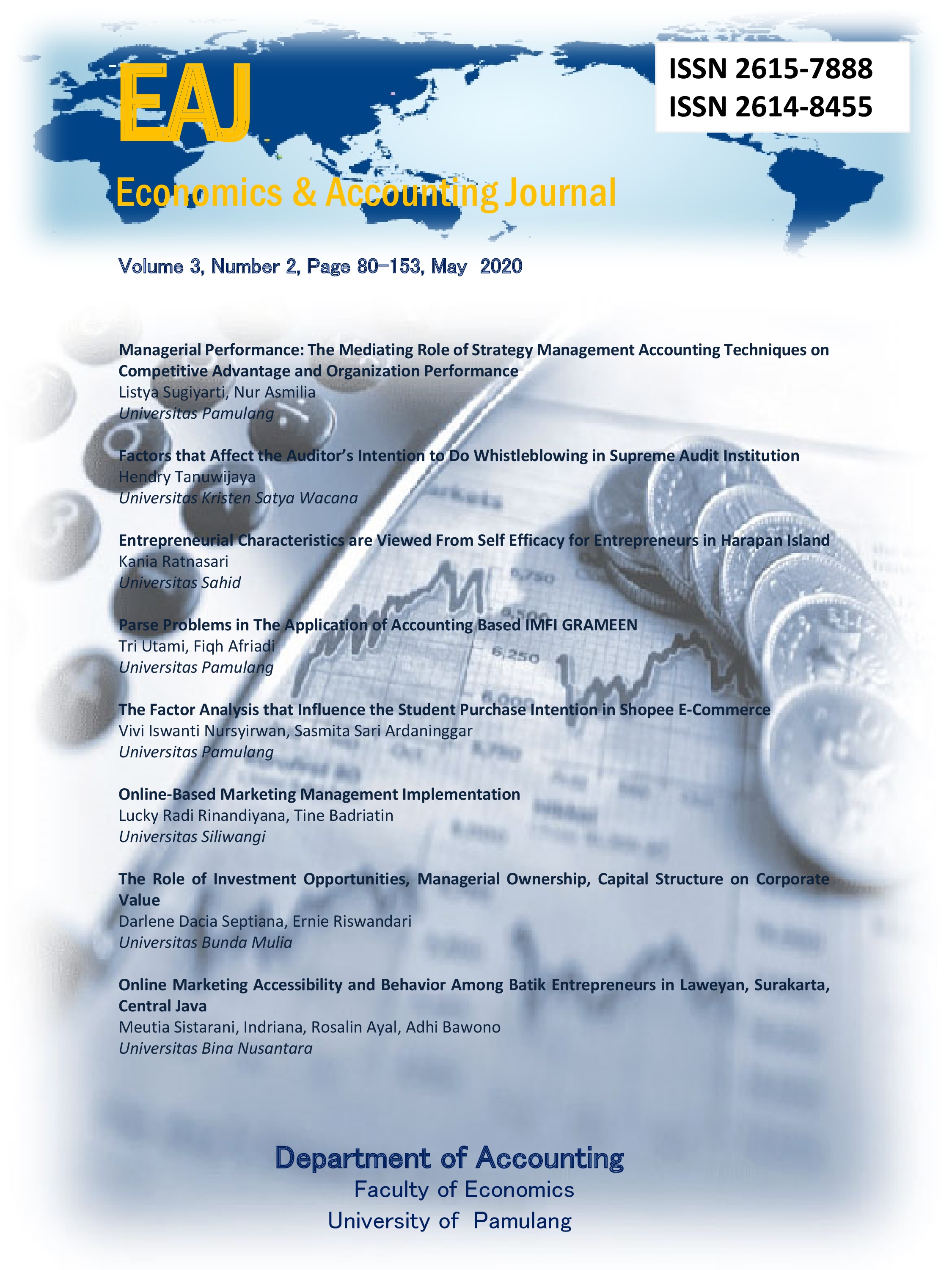Effect of Auditor Client Tenure, Company Growth, Auditor Reputation, and Leverage of Opinion Audit Going Concern
DOI:
https://doi.org/10.32493/eaj.v3i3.y2020.p172-184Keywords:
Auditor Client Tenure, Company Growth, Auditor Reputation, Leverage, Opinion Audit Going ConcernAbstract
The research objective was to examine and analyze the Influence of Auditor Client Tenure, Company Growth, Auditor Reputation, and Leverage toward Opinion Audit Going Concern. This survey was conducted at Manufacturing Companies registered on the Indonesia Stock Exchange for the period 2013-2017. The data used in this study is secondary data with sampling using purposive sampling method. The data analysis technique used is descriptive technique with a quantitative approach using descriptive statistical tests, multicollinearity test, logistic regression analysis, and coefficient determinant. Based on research has been conducted, the authors note that the auditor client tenure is not effect significantly to the opinion audit going concern, the company growth is not significant influence to opinion audit going concern, auditor reputation has a negative significant effect to opinion audit going concern, and leverage has a significant effect to opinion audit going concern
References
Agoes, S. (2012). Auditing Petunjuk Praktis Pemeriksaan Akuntan oleh Kantor Akuntan Publik Edisi 4. Salemba 4. Jakarta.
Alfiani, D. dan P. Nurmala. (2020). Pengaruh Ukuran Perusahaan, Profitabilitas, Solvabilitas, dan Reputasi Kantor Akuntan Publik terhadap Audit Delay. Journal of Technopreneurship on Economics and Business Review. Vol 1 No 2, Hal 79-99.
Alichia, Y.P. (2013). Pengaruh Ukuran Perusahaan, Pertumbuhan Perusahaan, dan Opini Audit Tahun Sebelumnya Terhadap Opini Audit Going Concern. Jurnal Akuntansi. Vol 1, No 1.
Amalia, K.A. (2016). Pengaruh Auditor Client Tenure, Ukuran Perusahaan,
Pertumbuhan Perusahaan, Reputasi Auditor, Leverage dan Financial Distress terhadap Opini Audit Gping Concern (Studi Empiris pada Perusahaan Manufaktur yang terdaftar di Bursa Efek Indonesia Tahun 2010-2014). Naskah Publikasi. Fakultas Ekonomi dan Bisnis Universitas Muhammadiyah Surakarta.
Andini, P. dan A.A. Mulya. (2015). Pengaruh Opini Audit Tahun Sebelumnnya, Pertumbuhan Perusahaan, Proporsi Komisaris Independen, Ukuran Komite Audit dan Debt Default terhadap Opini Audit Going Concern (Studi Empiris pada Perusahaan Manufaktur yang terdaftar pada BEI periode 2010-2014). Jurnal Akuntansi dan Keuangan. Vol. 4, No. 2.
Andriyanto, R., Effriyanti, E., & Hidayat, A. (2018). The Effect of Spiritual Intelligence (SQ) and Personality Types on Auditor’s Ability to Detect Fraud. JABI (Jurnal Akuntansi Berkelanjutan Indonesia), 1(3), 258-268.
Anita, W.F. (2017). Analisis Faktor-faktor yang mempengaruhi Opini Audit Going Concern pada Perusahaan Manufaktur yang terdaftar di Bursa Efek Indonesia periode 2010-2013. JRKA. Volume 3 Isue 2, Agustus 2017 Hal 87-108.
Arens, A.A., Elder, dan Beasley. (2008). Auditing dan Jasa Assurance. Pendekatan Terintegrasi Jilid 1. Edisi 12. Jakarta: Erlangga.
Brigham, E. F. dan J. F. Houston. (2011). Fundamentals of Financial Management. Jakarta: Salemba Empat.
Ghozali, I. (2013). Aplikasi Ananlisis Multivariate dengan Program IBM SPPS 21 Update PLS Regresi Edisi 7. Badan penerbit Universitas Diponegoro ISBN 979. 704. 015. 1. Semarang.
Gujarati, D. (2003). Ekonometri Dasar. Terjemahan: Sumarno Zain. Jakarta: Erlangga.
Hidayat, A. (2020). Pengaruh penggunaan aplikasi eviews terhadap kemampuan pemecahan masalah dan hasil belajar statistik. MAJU: Jurnal Ilmiah Pendidikan Matematika, 7(1), 18-24.
Jensen, M. C. and W.H Meckling. (1976). Theory of The Firm: Mangerial Behaviour Agency Cost and Ownership Structure. Journal of Financial Economics 3 (4): 305-360.
Messier, W.F., et al. (2014). Jasa Audit dan Assurance Pendekatan Sistematis. Jakarta: Salemba Empat.
Mutchler, J. (1985). A Multivariate-Analysis of The Auditors Going-Concern Opinion Decision. Journal of Accounting Research.
Petronela, T. (2004). Pertimbangan Going concern Perusahaan Dalam Pemberian. Opini Audit. Jurnal Balance, pp. 47-55.
Rahayu,A.W. and Pratiwi,C.W. (2011). Pengaruh opini audit tahun sebelumnya,pertumbuhan perusahaan,leverage dan reputasi auditor terhadap penerimaan opini audit going concern. Proceeding PESAT (Psikologi, Ekonomi, Sastra, Arsitektur &Sipil).
Rahman, A. dan B. Siregar. (2012). Faktor - Faktor Yang Mempengaruhi Kecenderungan Penerimaan Opini Audit Going Concern Pada Perusahaan Manufaktur Yang Terdaftar Di Bursa Efek Indonesia. Simposium Nasional Akuntansi XV. Banjarmasin.
Sartono, A. (2001). Manajemen Keuangan Teori dan Aplikasi. Yogyakarta: BPEF-Yogyakarta.
Siregar, H. dan P. Nurmala. (2019). Pengaruh Ukuran Perusahaan dan Penerimaan Opini Going Concern Terhadap Harga Saham. Jurnal Riset Keuangan dan Akuntansi. Vol 4 No 2. Hal 78-90.
Sugiyono. 2013. Metode penelitian kuantitatif, kualitatif dan R & D Bandung: Alfabeta CV.
Wardhani, D. F. (2017). Pengaruh Prediksi Kebangkrutan, Pertumbuhan
Perusahan dan Kualitas Audit Terhadap Penerimaan Opini Audit Going Concern (Studi Empiris pada Perusahaan Garmen dan Tekstil yang Listing di BEI periode 2010-2015. Skripsi. Sekolah Tinggi Ilmu Ekonomi Perbanas Surabaya.
Published
Issue
Section
License
Copyright (c) 2024 Putri Nurmala, Meisnawati Meisnawati, Nguyen Thu Thrang

This work is licensed under a Creative Commons Attribution-NonCommercial-ShareAlike 4.0 International License.
Authors who publish with this journal agree to the following terms:
- Authors retain copyright and grant the journal right of first publication with the work simultaneously licensed under a Creative Commons Attribution License that allows others to share the work with an acknowledgement of the work's authorship and initial publication in this journal.
- Authors are able to enter into separate, additional contractual arrangements for the non-exclusive distribution of the journal's published version of the work (e.g., post it to an institutional repository or publish it in a book), with an acknowledgement of its initial publication in this journal.
- Authors are permitted and encouraged to post their work online (e.g., in institutional repositories or on their website) prior to and during the submission process, as it can lead to productive exchanges, as well as earlier and greater citation of published work (See The Effect of Open Access).

This work is licensed under a Creative Commons Attribution-ShareAlike 4.0 International License.


